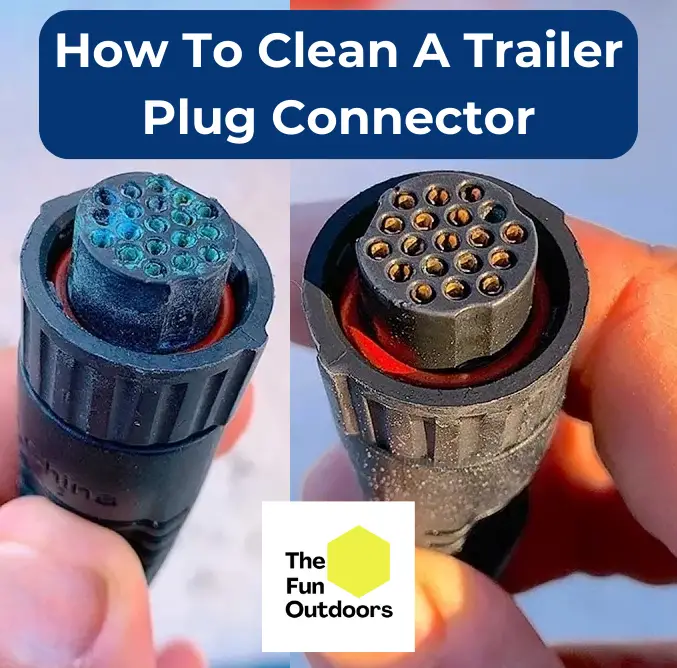Keeping your trailer plug connector clean is essential for ensuring a smooth and safe towing experience. A dirty or corroded connector can cause electrical problems, such as a malfunctioning brake light or turn signal, which can be dangerous on the road. In this article, we will guide you through how to clean a trailer plug connector to keep it in top condition.
Key Takeaways for Cleaning A Trailer Plug Connector:
- Keeping the trailer plug connector clean is essential for a safe and smooth towing experience. A dirty or corroded connector can cause electrical problems and safety hazards.
- Signs of a dirty trailer plug connector include corrosion, dirt and debris, rust, and loose or damaged pins. Regular inspection and cleaning are necessary to prevent these issues.
- You can easily clean your trailer plug connector using common household items.
- Prevent future corrosion by using dielectric grease, using plug covers, and keeping the connector clean.
Understanding Trailer Plug Connectors
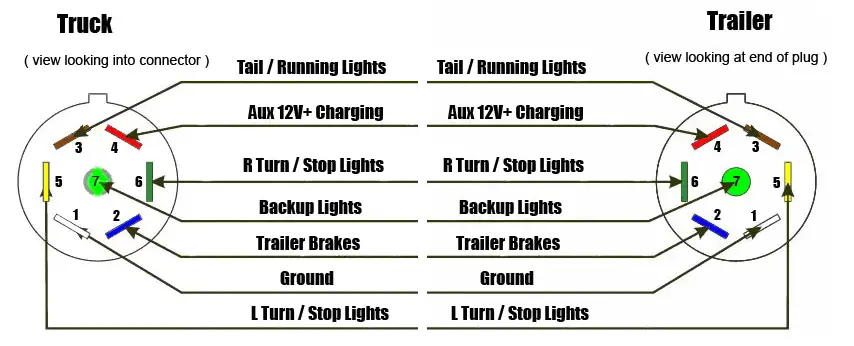
When it comes to towing a trailer, a reliable connection between the vehicle and the trailer is essential.
That’s where trailer plug connectors come in. These connectors are responsible for providing power to the trailer’s lights, brakes, and other electrical components.
Most trailers use a 7-pin connector, while some may use a 4-pin connector.
The 7-pin connector is more common and provides more functions compared to the 4-pin connector.
The pins on the connector are arranged in a specific way, so it’s essential to know which pin is responsible for what function.
Here’s a table that shows the pin layout for a 7-pin connector:
| Pin # | Function |
| 1 | Ground |
| 2 | Trailer Brakes |
| 3 | Tail or Running Lights |
| 4 | Aux 12V Power |
| 5 | Left Turn and Stop Lights |
| 6 | Right Turn and Stop Lights |
| 7 | Backup or Reverse Lights |
It’s crucial to ensure that the connector is clean and free of debris and corrosion.
Dirt and corrosion can cause poor connections, which can lead to electrical problems and safety hazards.
Here are some tips on how to clean a trailer plug connector:
- Use a wire brush to remove any dirt or debris from the connector pins.
- Apply a small amount of dielectric grease to the pins to protect them from corrosion.
- Use white vinegar to clean the connector and remove any corrosion. Make sure to dry the connector thoroughly before applying dielectric grease.
Remember, a clean and well-maintained trailer plug connector is essential for safe and reliable towing.
Signs of a Dirty Trailer Plug Connector
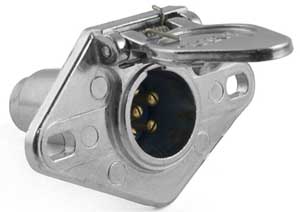
If you’re experiencing issues with your trailer’s electrical system, it may be time to take a closer look at your trailer plug connector.
A dirty connector can cause a range of problems, from intermittent power to complete failure.
Here are a few signs that your trailer plug connector may be dirty:
Corrosion
Corrosion is a common issue with trailer plug connectors, especially if they’re exposed to the elements.
Look for signs of green or white buildup on the connector pins or inside the connector housing.
Corrosion can cause poor electrical contact, leading to intermittent power or complete failure.
Dirt and Debris
Dirt and debris can accumulate on the trailer plug connector over time, especially if it’s not covered when not in use.
Look for signs of dirt or debris on the connector pins or inside the connector housing.
Dirt and debris can cause poor electrical contact, leading to intermittent power or complete failure.
Rust
Rust can be a problem if your trailer plug connector is made of metal.
Look for signs of rust on the connector pins or inside the connector housing.
Rust can cause poor electrical contact, leading to intermittent power or complete failure.
Loose or Damaged Pins
If your trailer plug connector has loose or damaged pins, it can also cause poor contact, leading to intermittent power or complete failure.
Look for pins that are bent, corroded, or missing altogether.
How To Clean a Trailer Plug Connector
Cleaning your trailer plug connector is an important aspect of trailer maintenance.
Over time, dirt, grime, and corrosion can accumulate on the metal contacts of the plug, leading to poor electrical connections and a weak signal.
Here are some steps you can take to clean your trailer plug connector and ensure it fits snugly into your vehicle’s socket.
Materials Needed
- Contact cleaner
- White vinegar
- Water
- Wire brush
- WD-40
- Pipe cleaner
- Dielectric grease
Step-by-Step Guide
- Disconnect the trailer plug from the vehicle’s socket.
- Inspect the surface of the plug for any dirt, grime, or corrosion.
- Use a wire brush to remove any visible dirt or corrosion from the metal pins and terminals.
- Spray contact cleaner on the pins and terminals to remove any remaining dirt or grime.
- Use a pipe cleaner to clean any hard-to-reach areas of the plug.
- Mix equal parts white vinegar and water in a container.
- Dip the plug into the vinegar and water solution for a few minutes.
- Remove the plug from the solution and rinse it with water.
- Dry the plug thoroughly with a clean cloth.
- Apply a small amount of WD-40 to the metal pins and terminals to prevent future corrosion.
- Apply a thin layer of dielectric grease to the pins and terminals to ensure a good electrical connection.
By following these steps, you can keep your trailer plug connector clean and dry, ensuring a strong electrical connection with your vehicle’s socket.
Remember to clean your trailer plug regularly to prevent dirt and corrosion from building up and affecting the fit and performance of your trailer.
Materials Needed for Cleaning
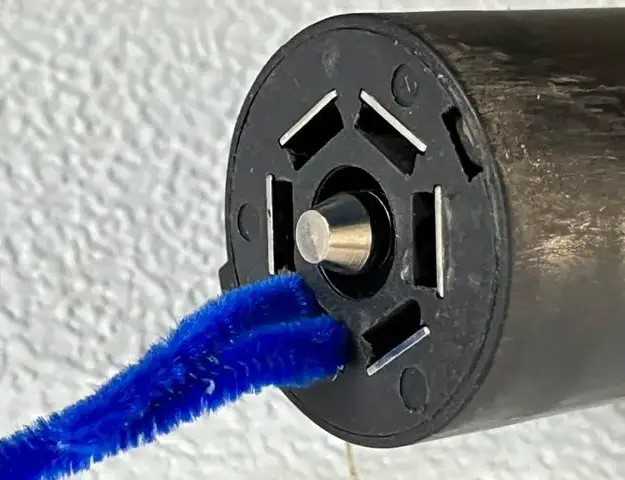
When it comes to cleaning your trailer plug connector, you’ll need a few materials to get the job done right. Here are some of the most commonly used solutions and products:
- WD-40: This is a popular lubricant and cleaner that can be used to remove corrosion and dirt from your trailer plug connector. It can help to displace moisture and prevent future corrosion. However, it may not be the best option for long-term use as it can attract dirt and dust.
- Dielectric Grease: This is a silicone-based grease that can be used to protect your trailer plug connector from moisture and corrosion. It can also help to improve electrical conductivity. However, it may not be the best option for cleaning as it can attract dirt and dust.
- Contact Cleaner: This is a spray cleaner that is specifically designed for cleaning electrical contacts. It can help to remove dirt, dust, and corrosion from your trailer plug connector. However, it may not be the best option for long-term use as it can attract dirt and dust.
- Vinegar and Water: This is a natural solution that can be used to remove corrosion and dirt from your trailer plug connector. It can help to dissolve the corrosion and make it easier to remove. However, it may not be the best option for long-term use as it can attract dirt and dust.
- Wire Brush: This is a tool that can be used to remove corrosion and dirt from your trailer plug connector. It can help to scrape away the corrosion and make it easier to remove. However, it may not be the best option for long-term use as it can scratch the surface of the connector.
- Toothbrush: This is a tool that can be used to scrub away dirt and corrosion from your trailer plug connector. It can help to remove the dirt and make it easier to clean. However, it may not be the best option for long-term use as it can scratch the surface of the connector.
- Baking Soda: This is a natural solution that can be used to remove corrosion and dirt from your trailer plug connector. It can help to neutralize the acid in the corrosion and make it easier to remove. However, it may not be the best option for long-term use as it can attract dirt and dust.
- Pipe Cleaner: This is a tool that can be used to remove dirt and corrosion from your trailer plug connector. It can help to scrub away the dirt and make it easier to clean. However, it may not be the best option for long-term use as it can scratch the surface of the connector.
- Electrical Contact Cleaner: This is a spray cleaner that is specifically designed for cleaning electrical contacts. It can help to remove dirt, dust, and corrosion from your trailer plug connector. However, it may not be the best option for long-term use as it can attract dirt and dust.
When choosing a cleaning solution or product, it’s important to consider the specific needs of your trailer plug connector.
Some solutions may be more effective than others, depending on the level of corrosion and dirt buildup.
It’s also important to follow the manufacturer’s instructions carefully to avoid damaging the connector.
Preparation Before Cleaning
Before you start cleaning your trailer plug connector, it’s important to take a few steps to ensure that you’re properly prepared and that you don’t damage any of the components.
Here are some things to keep in mind:
Disconnect the Trailer
Before you start cleaning the trailer plug connector, make sure that the trailer is disconnected from the tow vehicle.
This will prevent any electrical current from flowing through the connector while you’re cleaning it, which could be dangerous.
Inspect the Connector
Take a close look at the connector to see if there are any obvious signs of damage or wear.
Look for things like rust, corrosion, or bent pins that could be affecting the performance of the connector.
If you notice any issues, you may need to replace the connector instead of cleaning it.
Gather Your Supplies
Make sure that you have all of the supplies that you need to clean the connector before you start.
This might include things like contact cleaner, white vinegar, a wire brush, or a pipe cleaner.
Having everything on hand before you start will make the process go more smoothly.
Protect the Tow Vehicle
If you’re cleaning the connector while it’s still attached to the tow vehicle, you’ll want to take steps to protect the truck bed and other components from any cleaning products or debris that might come off of the connector.
You can use a towel or a piece of cardboard to create a barrier between the connector and the truck bed.
By following these simple steps, you can ensure that you’re properly prepared to clean your trailer plug connector and that you don’t accidentally damage any of the components.
Preventing Future Corrosion
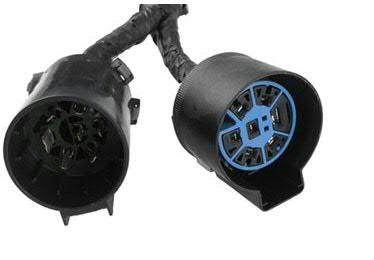
Now that you have cleaned your trailer plug connector, you want to make sure that it stays clean and functional for as long as possible.
Here are some tips on how to prevent future corrosion:
Use Dielectric Grease
Dielectric grease is an excellent way to prevent corrosion on your trailer plug connector.
It is a silicone-based grease that does not conduct electricity and is resistant to water and heat.
You can apply a small amount of dielectric grease to the pins of your trailer plug connector to protect them from corrosion.
This will help ensure that your trailer plug connector stays clean and functional for a long time.
Apply Grease or Vaseline
Another way to prevent corrosion is to apply grease or Vaseline to the pins of your trailer plug connector.
This will help protect them from moisture and other contaminants that can cause corrosion.
You can use any type of grease or Vaseline, but make sure to apply it sparingly to avoid any mess.
Use Plug Covers
Plug covers are another way to protect your trailer plug connector from corrosion.
These covers are designed to fit over your trailer plug connector and protect it from moisture and other contaminants.
You can find plug covers at any auto parts store or online.
Keep Your Trailer Plug Connector Clean
Finally, the best way to prevent corrosion is to keep your trailer plug connector clean.
Make sure to clean it regularly using one of the methods described in this article.
This will help remove any dirt, grime, or other contaminants that can cause corrosion.
By following these tips, you can help ensure that your trailer plug connector stays clean and functional for a long time.
Remember to inspect your trailer plug connector regularly and clean it as needed to prevent corrosion.
Check out our other guides for towing and trailer safety while you’re here:

